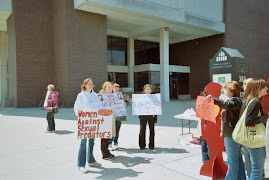Bikers Against Child Abuse
By Theresa Petry,January 18, 2008, 10:03 PM CST
Some 600 bikers have invaded the Casino Queen for the weekend.
It's for the annual Bikers Against Child Abuse, BACA, convention. BACA members from across the country and even Australia filed into a Casino Queen conference room.
Watch
"We've made a big impact in Australia," reported "snap" from an Australia chapter.
It's an overwhelming sight for the social worker and therapist from Utah who started BACA just 13 years ago. "It's beyond my wildest dreams," said J.P. "Chief" Lilly.
Inside the conference room they watched Josh's story. "I still have some nightmares," confessed Josh Osborne.
For years in his Tennessee home he was chained to his bed by his father and stepmother. Barely fed at 15-years-old, he weighed a mere 48 pounds when police rescued him.
"We protect these children, that's what we do," cried "Angel" from the St. Louis BACA Chapter.
"We didn't know about BACA until they came into Josh's life," confessed his aunt, Jill Barber. Josh's aunt and uncle say they had no idea he was being abused. "We learned about what happened to him just like everyone else did on the news," said Jill.
Now 18-years-old he weighs 100 pounds and attributes his strength to BACA.
"In my opinion they have helped save his life," exclaimed Josh's uncle, Michael Barber.
Josh was supposed to be in St. Louis to personally thank and address BACA. Unfortunately, he had to be hospitalized Thursday night. He's been in and out of the hospital for years because of the toll the abuse has taken on his body.
He needs a kidney transplant but his heart overflows with love for BACA for making him feel safe and secure.
"If the child needs them to stay the night outside in the yard just so they'll feel safe during the night BACA will do that," said Michael.
For Josh they were in court, at his prom, and they helped him find his voice. Now he's using his voice to let other children know there is help if they need it.
"Every time Josh hears a motorcycle engine he assumes that is someone looking out for him and that's very powerful," his aunt said smiling.
The rumble of an engine mixed with Josh's voice is a sweet harmony of hope BACA wants to stream across the globe.
Josh's long term prognosis isn't known. His father and step mother were both sentenced to six years in prison. Meanwhile, his aunt and uncle are fighting to change child abuse laws across the nation.You can find more on Josh's story at http://missingandmurderedchildren.facesofthemissing.org/?cat=112
To learn more or join their fight against child abuse email Jill at barberhollow@comcast.net
or call The Barber Hollow Foundation at 615-417-6099.
Visit www.bacausa.com
to learn more about Bikers Against Child Abuse.
Or contact BACA locally at 314-719-2928.
Emails can be sent to Angel at baca_angel@yahoo.com
http://video.cw11tv.com/global/video/popup/pop_player.asp?ClipID1=2113185&h1=Bikers%20Against%20Child%20Abuse&vt1=v&at1=News&d1=157333&LaunchPageAdTag=News&fvCatNo=&backgroundImageURL=&activePane=info&playerVersion=1&hostPageUrl=http%3A//cw11tv.trb.com/news/kplr-news-011808-6%2C0%2C3018698.story&rnd=49183046
Hungry Wolves
-
This world really is sick and diluted with power hungry wolves who devour
any thing in their path.
As I look for the outcome of so many missing Childre...
3 years ago


